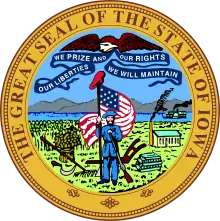Palo Alto County, Iowa
Palo Alto County is a county located in the U.S. state of Iowa. As of the 2010 census, the population was 9,421.[1] The county seat is Emmetsburg.[2] It is named after the Battle of Palo Alto, the first major battle of the Mexican–American War.[3]
Palo Alto County | |
|---|---|
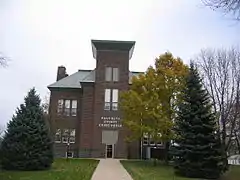 | |
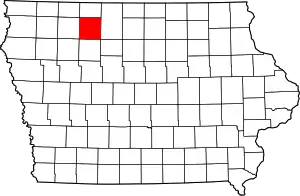 Location within the U.S. state of Iowa | |
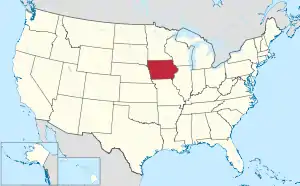 Iowa's location within the U.S. | |
| Coordinates: 43°04′48″N 94°40′51″W | |
| Country | |
| State | |
| Founded | January 15, 1851 |
| Named for | Battle of Palo Alto |
| Seat | Emmetsburg |
| Largest city | Emmetsburg |
| Area | |
| • Total | 569 sq mi (1,470 km2) |
| • Land | 564 sq mi (1,460 km2) |
| • Water | 5.6 sq mi (15 km2) 1.0% |
| Population (2010) | |
| • Total | 9,421 |
| • Estimate (2018) | 8,929 |
| • Density | 17/sq mi (6.4/km2) |
| Time zone | UTC−6 (Central) |
| • Summer (DST) | UTC−5 (CDT) |
| Congressional district | 4th |
| Website | paloaltocountyiowa |
Geography
According to the U.S. Census Bureau, the county has a total area of 569 square miles (1,470 km2), of which 564 square miles (1,460 km2) is land and 5.6 square miles (15 km2) (1.0%) is water.[4]
Major highways
 U.S. Highway 18
U.S. Highway 18 Iowa Highway 4
Iowa Highway 4 Iowa Highway 15
Iowa Highway 15
Adjacent counties
- Emmet County (north)
- Kossuth County (east)
- Pocahontas County (south)
- Clay County (west)
Demographics
| Historical population | |||
|---|---|---|---|
| Census | Pop. | %± | |
| 1860 | 132 | — | |
| 1870 | 1,336 | 912.1% | |
| 1880 | 4,131 | 209.2% | |
| 1890 | 9,618 | 132.8% | |
| 1900 | 14,354 | 49.2% | |
| 1910 | 13,845 | −3.5% | |
| 1920 | 15,486 | 11.9% | |
| 1930 | 15,398 | −0.6% | |
| 1940 | 16,170 | 5.0% | |
| 1950 | 15,891 | −1.7% | |
| 1960 | 14,736 | −7.3% | |
| 1970 | 13,289 | −9.8% | |
| 1980 | 12,721 | −4.3% | |
| 1990 | 10,669 | −16.1% | |
| 2000 | 10,147 | −4.9% | |
| 2010 | 9,421 | −7.2% | |
| 2018 (est.) | 8,929 | [5] | −5.2% |
| U.S. Decennial Census[6] 1790-1960[7] 1900-1990[8] 1990-2000[9] 2010-2018[1] | |||
2010 census
The 2010 census recorded a population of 9,421 in the county, with a population density of 16.7089/sq mi (6.4514/km2). There were 4,628 housing units, of which 3,994 were occupied.[10]
2000 census
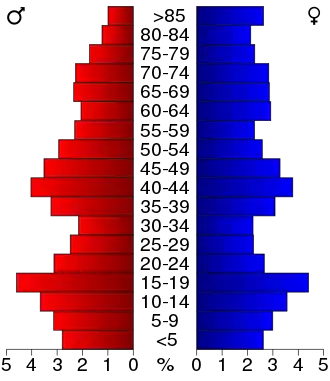
As of the census[11] of 2000, there were 10,147 people, 4,119 households, and 2,673 families residing in the county. The population density was 18 people per square mile (7/km2). There were 4,631 housing units at an average density of 8 per square mile (3/km2). The racial makeup of the county was 98.62% White, 0.09% Black or African American, 0.19% Native American, 0.31% Asian, 0.04% Pacific Islander, 0.19% from other races, and 0.57% from two or more races. 0.76% of the population were Hispanic or Latino of any race.
There were 4,119 households, out of which 28.50% had children under the age of 18 living with them, 56.30% were married couples living together, 5.90% had a female householder with no husband present, and 35.10% were non-families. 30.40% of all households were made up of individuals, and 16.10% had someone living alone who was 65 years of age or older. The average household size was 2.37 and the average family size was 2.96.
In the county, the population was spread out, with 24.00% under the age of 18, 9.50% from 18 to 24, 23.20% from 25 to 44, 21.90% from 45 to 64, and 21.30% who were 65 years of age or older. The median age was 41 years. For every 100 females there were 94.70 males. For every 100 females age 18 and over, there were 92.10 males.
The median income for a household in the county was $32,409, and the median income for a family was $41,808. Males had a median income of $28,344 versus $19,655 for females. The per capita income for the county was $17,733. About 6.60% of families and 10.60% of the population were below the poverty line, including 12.20% of those under age 18 and 9.10% of those age 65 or over.
Communities
- Ayrshire
- Curlew
- Cylinder
- Emmetsburg
- Graettinger
- Mallard
- Rodman
- Ruthven
- West Bend (partially)
Townships
Population ranking
The population ranking of the following table is based on the 2010 census of Palo Alto County.[12]
† county seat
| Rank | City/Town/etc. | Municipal type | Population (2010 Census) |
|---|---|---|---|
| 1 | † Emmetsburg | City | 3,904 |
| 2 | Graettinger | City | 844 |
| 3 | West Bend (partially in Kossuth County) | City | 761 (785 total) |
| 4 | Ruthven | City | 737 |
| 5 | Mallard | City | 274 |
| 6 | Ayrshire | City | 143 |
| 7 | Cylinder | City | 88 |
| 8 | Curlew | City | 58 |
| 9 | Rodman | City | 45 |
Politics
| Year | Republican | Democratic | Third Parties |
|---|---|---|---|
| 2020 | 68.0% 3,370 | 30.6% 1,519 | 1.4% 69 |
| 2016 | 65.5% 3,081 | 29.7% 1,398 | 4.8% 224 |
| 2012 | 54.4% 2,660 | 43.8% 2,139 | 1.8% 88 |
| 2008 | 47.7% 2,294 | 50.5% 2,428 | 1.8% 86 |
| 2004 | 51.5% 2,674 | 47.8% 2,482 | 0.7% 35 |
| 2000 | 48.5% 2,341 | 48.2% 2,326 | 3.2% 156 |
| 1996 | 38.6% 1,817 | 50.4% 2,371 | 11.0% 515 |
| 1992 | 33.3% 1,789 | 44.1% 2,374 | 22.6% 1,216 |
| 1988 | 37.4% 2,041 | 61.8% 3,377 | 0.8% 45 |
| 1984 | 46.7% 2,715 | 51.9% 3,018 | 1.3% 77 |
| 1980 | 50.7% 3,025 | 41.3% 2,463 | 8.0% 480 |
| 1976 | 44.4% 2,623 | 53.9% 3,182 | 1.7% 99 |
| 1972 | 51.8% 3,141 | 46.9% 2,845 | 1.3% 80 |
| 1968 | 50.0% 3,114 | 46.2% 2,874 | 3.8% 235 |
| 1964 | 33.2% 2,206 | 66.8% 4,441 | 0.0% 0 |
| 1960 | 49.0% 3,551 | 51.0% 3,695 | 0.0% 3 |
| 1956 | 51.1% 3,795 | 48.8% 3,624 | 0.0% 2 |
| 1952 | 60.5% 4,595 | 39.4% 2,993 | 0.1% 9 |
| 1948 | 39.3% 2,594 | 58.5% 3,858 | 2.3% 149 |
| 1944 | 42.4% 2,772 | 57.0% 3,726 | 0.5% 35 |
| 1940 | 42.5% 3,322 | 57.3% 4,482 | 0.2% 18 |
| 1936 | 35.6% 2,613 | 61.6% 4,515 | 2.8% 205 |
| 1932 | 36.2% 2,378 | 62.3% 4,094 | 1.5% 96 |
| 1928 | 54.5% 3,463 | 44.7% 2,843 | 0.8% 49 |
| 1924 | 49.5% 2,943 | 10.0% 593 | 40.5% 2,411 |
| 1920 | 71.4% 3,904 | 26.8% 1,467 | 1.7% 95 |
| 1916 | 48.5% 1,594 | 49.6% 1,630 | 1.9% 63 |
| 1912 | 30.3% 953 | 40.5% 1,274 | 29.2% 918 |
| 1908 | 52.8% 1,639 | 43.2% 1,340 | 4.0% 124 |
| 1904 | 63.3% 1,999 | 34.2% 1,081 | 2.4% 77 |
| 1900 | 55.5% 1,908 | 42.9% 1,477 | 1.6% 55 |
| 1896 | 50.0% 1,595 | 48.5% 1,547 | 1.5% 48 |
References
- "State & County QuickFacts". United States Census Bureau. Archived from the original on June 7, 2011. Retrieved July 20, 2014.
- "Find a County". National Association of Counties. Retrieved June 7, 2011.
- McCarty, Dwight Gaylord (1910). History of Palo Alto County, Iowa. Torch Press. p. 63.
- "US Gazetteer files: 2010, 2000, and 1990". United States Census Bureau. February 12, 2011. Retrieved April 23, 2011.
- "Population and Housing Unit Estimates". Retrieved June 24, 2019.
- "U.S. Decennial Census". United States Census Bureau. Retrieved July 20, 2014.
- "Historical Census Browser". University of Virginia Library. Retrieved July 20, 2014.
- "Population of Counties by Decennial Census: 1900 to 1990". United States Census Bureau. Retrieved July 20, 2014.
- "Census 2000 PHC-T-4. Ranking Tables for Counties: 1990 and 2000" (PDF). United States Census Bureau. Retrieved July 20, 2014.
- "Population & Housing Occupancy Status 2010". United States Census Bureau - American FactFinder. Retrieved May 31, 2011.
- "U.S. Census website". United States Census Bureau. Retrieved January 31, 2008.
- 2010 Census
- Leip, David. "Dave Leip's Atlas of U.S. Presidential Elections". uselectionatlas.org. Retrieved April 27, 2018.
